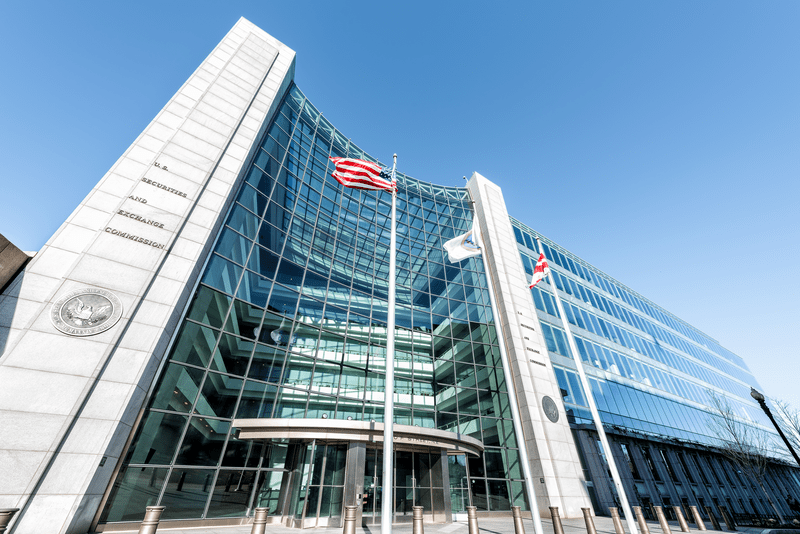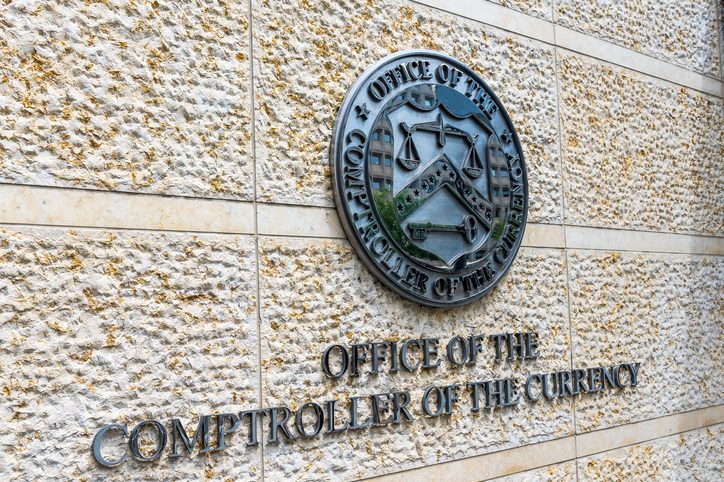The House Financial Services Committee, led by Chairman Patrick McHenry (R-NC), held a hearing on Wednesday, saying it was his committee’s time “to conduct oversight of President Biden’s prudential banking regulators.”
In prepared remarks, McHenry outlined his committee’s upcoming agenda, saying Republicans are now holding Federal Deposit Insurance Corporation (FDIC) Chairman Martin Gruenberg accountable “for his continued efforts to stonewall Congressional oversight amid a staff report that confirmed allegations of a toxic workplace culture at the banking regulator under his watch.”
McHenry said the committee will also scrutinize the regulatory initiatives pushed by President Biden’s federal banking regulators, including the Basel III Endgame proposal (requiring higher capital requirements), which McHenry called “disastrous.”
Prepared remarks
We have reproduced Chairman McHenry’s opening remarks as prepared – worded as if delivered to President Joe Biden – in full because they make for such interesting reading. Our analysis and commentary follows this excerpt. The remarks are as follows:
The era of post-financial crisis regulation is over.
For the past decade, your agencies have worked to push credit risk out of the banking system. At the same time, you completely missed the interest rate risks on bank balance sheets. This led to three of the largest bank failures in American history last year.
Time and again, your agencies have also worked to stifle the beneficial role that innovation and technology play in our financial system. It’s clear our banking regulators, under Democrat leadership, have been busy fighting the last war.
Your backward-looking approach to regulation has harmed our financial system, innovation, and consumers. In contrast, the House overwhelmingly voted to reject your approach and embrace our inevitable technology-based future by passing FIT21.
Our digital asset market structure bill represents the largest rewrite of financial regulatory law since Dodd-Frank, and more than 71 Democratic Members supported the legislation. I repeat: the most extensive rewrite of financial regulation since Dodd-Frank passed with overwhelming bipartisan support.
We need new, technology-based solutions that strengthen our financial system, help consumers, and make our regulators more efficient. Instead of working with Congress to identify these solutions, your agencies have proposed a regulatory onslaught amounting to a sweeping rewrite of the rules governing US financial institutions.
“The American people have lost trust in our regulators’ ability to act in their best interest.
Patrick McHenry, Chairman, House Financial Services Committee
These proposals frequently included inadequate economic analysis, weak justification, and limited public engagement. Your power grabs not only harm consumers and our financial system, but they also erode the credibility of your historically independent agencies.
First, the Biden Administration’s politicized, partisan regulatory agenda has destroyed your agencies’ credibility with Congress. By skirting Congressional oversight and ignoring the will of the people’s representatives, you have eliminated the trust in your agencies to act independent of politics.
Second, your overreaching rulemakings diminish your credibility with the courts.
Even after the Supreme Court’s decision in West Virginia v. EPA, this administration’s regulators are pushing new rules with paltry – and sometimes non-existent – statutory justification.
Third, the American people have lost trust in our regulators’ ability to act in their best interest. This administration’s regulators have repeatedly advanced rules that reduce access and increase costs of the financial products used by everyday Americans. Because of your actions, the political independence and authority of your agencies is in danger of being reduced, whether it’s by Congress, the President, or the courts.
I’m sure my colleagues across the aisle will disagree, so I’ll close by running through the facts: The OCC has been led by an acting head for all four years of the Biden Administration. Yet, Mr Hsu, you have gone along with every politicized initiative put forward.
Vice Chair Barr, your headline proposal – Basel III Endgame – was rejected by your colleagues and the public. Meanwhile, all three banks that failed last year were under Fed supervision.
Chair Gruenberg, you’re in a league of your own. Your failed leadership of the FDIC will result in a total overhaul of the agency in the coming years. Resigning in January is too little, too late. That’s why Republicans introduced a resolution calling for your immediate termination.
Chairman Harper, thanks for being here. As I said, the era of post-financial crisis regulation is over. This administration’s regulators failed to see it. And unfortunately, for you all, it’s too late to right the ship.
Perspective
Gruenberg will retire from the agency, effective January 19, he told employees earlier this week. McHenry’s calls for his immediate termination will be debated in Congress, but suffice to say that Gruenberg’s pending departure clears the way for Trump to nominate his own candidate to lead the FDIC – possibly Republican Travis Hill, the FDIC’s current vice chair.
As McHenry’s notes in invoking the Basel III Endgame, federal regulators have already expressed interest in revising down such capital rules – and liquidity ones – back in the spring.
With Republicans set to control the Senate and the House as final races are called around the country, they have a governing trifecta they could use to wipe away some rules and dramatically shift the regulatory landscape.
FIT21 was a bipartisan, legislative plan to clarify the role of different regulatory agencies in the oversight of crypto industry, and on May 22, the US House of Representatives passed it. FIT stands for the “Financial Innovation and Technology for the 21st Century Act” and it was the result of efforts by varied crypto stakeholders, including legislators, industry participants, and interested financial institutions.
The stalled legislation would provide a clearer set of tests to determine if a cryptocurrency is a security or commodity. In making this critical determination, the bill seeks to outline more clearly the jurisdiction over cryptocurrency between regulators, increase consumer protections, and clarify compliance obligations.
FIT21 proposes a dual-regulatory jurisdiction between the SEC and CFTC, depending on whether the asset is a digital asset or a digital commodity is requiring the SEC and CFTC to develop joint rules that specify how an entity may dually register with both agencies.
However, skepticism over whether joint rulemaking and oversight has plagued the legislation and is warranted, as both agencies have resisted any prompt rulemaking, despite countless pleas for it, and basically the two have engaged in a multi-year tussle over crypto jurisdiction.
The “you completely missed the interest rate risks on bank balance sheets” which led to “three of the largest bank failures in American history last year” is a bit unfair, considering the interest rates were borne of factors related to a global pandemic and such rates are more the decision of the Federal Reserve and its unique set of powers – not presidential leadership.
Plus, interest rates are not a meaningful tool for assessing bank failures, since they are often the result of decisions made over long periods of time. The ones McHenry is thinking about – such as at Silicon Valley Bank – were also due to a concentration of uninsured deposits from a small number of clients in the technology and venture capital sectors.
Agency authority
McHenry refers to the 2022 Supreme Court case, West Virginia v. EPA, which limited the Environmental Protection Agency’s (EPA’s) options for regulating greenhouse gas emissions by saying the agency lacks the authority under the Clean Air Act to impose emissions gaps by shifting electricity production from higher-emitting to lower-emitting producers.
The Court further explained – for the first time – that an administrative agency has no power to make decisions on such “major questions” unless Congress “clearly” gave it such authority. And this paved the way for its essential gutting of the Chevron Doctrine earlier this year in two noteworthy cases with potentially huge ramifications (and limitations) on regulatory agency power.
He cited it to criticize regulatory overreach, which other conservative members of the actual regulatory agency regime have similarly decried, saying way too many new rules were issued “with paltry – and sometimes non-existent – statutory justification.”
What SEC Chair Gary Gensler and former SEC Enforcement Director Gurbir Grewal would say, though, is that modern-day technology and investing styles ushered in new risks, requiring new or amended rules to address them – from shortening the settlement cycle; to enabling stocks to be quoted in narrower increments down to a half of a penny (which were unanimously approved); to seeking new disclosures and audits from private funds (shot down in federal court) and climate risk disclosures from certain companies (stalled and now likely dead or significantly scaled back).
Cryptocurrency
The SEC has also taken well-established rules and applied them to new circumstances in the past few years as well, such as in the cryptocurrency sector – using general fraud rules like Rule 10b-5 – and using the bedrock 17(a)(1) business records rules in the off-channel communications recordkeeping cases.
These extensions of existing rules also drew ire from Republicans, just to supplement their insistence that the agency was promulgating too many new ones.
Their annoyance could be forgiven – Chair Gensler did trigger an incredible rulemaking onslaught that was overly hard on businesses, especially affecting the less-than-large ones. And a too-tough stance on blockchain technology that is connected to crypto (whether actually or implicitly connected) ignores the fact that blockchain offers unique benefits such as increasing trust, security and transparency among member organizations by improving the traceability of data shared across a business network.
But sometimes the excitement around such risky products like digital assets conveniently ignores the fact that a good number of retail investors may not actually know what is best for them while they invest in crypto, becoming caught up in herd mentality at times, often using an easily accessed app on their phone.
And Republicans do support rulemaking in certain areas, such as increasing sanctions on China, and tapping a new Trump administration appointee to lead the Federal Communications Commission (Brendan Carr) who supports regulations that would “impose transparency rules on Big Tech.”
They like rules. Just certain ones.
With Republicans set to control the Senate and the House as final races are called around the country, they have a governing trifecta they could use to wipe away some rules and dramatically shift the regulatory landscape. And this is true especially if they use the Congressional Review Act (CRA).
Passed by a Republican-controlled Congress but signed into law by Democratic president Bill Clinton, the CRA allows lawmakers to use an expedited procedure to repeal recently enacted agency rules – even if the rules took years to develop and were initially ordered by acts of Congress. Usually, legislation reversing government rules requires at least 60 Senate votes to overcome a potential filibuster, but under the CRA, recent rules can be revoked through a simple majority vote of 51 senators.












